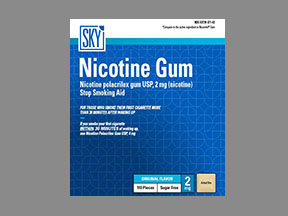
Cvs Nicotine Polacrilex Coupons & Savings Card – Discount Prices from $16.02
Brand for: Nicotine polacrilex
My prescription
Edit
2MG, Nicotine Polacrilex (100 Gums)
Select pharmacy

Walgreens
$16.02
COUPON PRICE
Albertsons
$25.52
COUPON PRICE
Walmart
$37.21
COUPON PRICECvs Nicotine Polacrilex savings card
Show this card to your pharmacist
Walgreens
$16.02
BIN
ID
PCN
GRP
011867
LH4EDB8EB7
HT
LABH001
Powered by
More prescriptions for smoking cessation
More prescriptions for smoking cessation
Cvs Nicotine Polacrilex (Nicotine Polacrilex) dosage forms
Dosage Quantity Price from Per unit 2MG 100 Gums $29.90 $0.30 2MG 10 Gums $11.09 $1.11 2MG 20 Gums $13.18 $0.66 2MG 40 Gums $17.36 $0.43 2MG 50 Gums $19.45 $0.39 2MG 110 Gums $31.99 $0.29 2MG 120 Gums $34.08 $0.28 2MG 160 Gums $42.44 $0.27 2MG 170 Gums $44.53 $0.26 2MG 220 Gums $54.98 $0.25
| Dosage | Quantity | Price from | Per unit |
|---|---|---|---|
| 2MG | 100 Gums | $29.90 | $0.30 |
| 2MG | 10 Gums | $11.09 | $1.11 |
| 2MG | 20 Gums | $13.18 | $0.66 |
| 2MG | 40 Gums | $17.36 | $0.43 |
| 2MG | 50 Gums | $19.45 | $0.39 |
| 2MG | 110 Gums | $31.99 | $0.29 |
| 2MG | 120 Gums | $34.08 | $0.28 |
| 2MG | 160 Gums | $42.44 | $0.27 |
| 2MG | 170 Gums | $44.53 | $0.26 |
| 2MG | 220 Gums | $54.98 | $0.25 |
| 2MG | 240 Gums | $59.16 | $0.25 |
| 4MG | 10 Gums | $11.52 | $1.15 |
| 4MG | 20 Gums | $14.04 | $0.70 |
| 4MG | 40 Gums | $19.08 | $0.48 |
| 4MG | 50 Gums | $21.60 | $0.43 |
| 4MG | 100 Gums | $34.20 | $0.34 |
| 4MG | 110 Gums | $36.72 | $0.33 |
| 4MG | 160 Gums | $49.32 | $0.31 |
| 4MG | 170 Gums | $51.84 | $0.30 |
| 4MG | 220 Gums | $64.44 | $0.29 |
| 4MG | 240 Gums | $69.48 | $0.29 |
Is nicotine polacrilex bad for you?
Nicotine polacrilex is a form of nicotine used in nicotine replacement therapy to help people quit smoking. While it is generally considered safer than smoking tobacco, it is not without risks. Potential side effects can include mouth irritation, hiccups, nausea, and heartburn. It is important for individuals to use it as directed and consult with a healthcare provider to ensure it is appropriate for their situation.
Is nicotine polacrilex the same as nicotine?
Nicotine polacrilex is a form of nicotine bound to an ion-exchange resin, commonly used in nicotine replacement therapies like gum or lozenges. While it contains nicotine, it is specifically formulated to aid in smoking cessation by providing controlled release of nicotine to help reduce withdrawal symptoms and cravings.
Using the SaveHealth discount card, what is the price of Cvs Nicotine Polacrilex without insurance?
Using the SaveHealth discount card, the price of Cvs Nicotine Polacrilex without insurance is $16.02.
What is the price of Cvs Nicotine Polacrilex at Walgreens?
The price of Cvs Nicotine Polacrilex at Walgreens is $16.02.
What is the price of Cvs Nicotine Polacrilex at Walmart?
The price of Cvs Nicotine Polacrilex at Walmart is $37.21.
